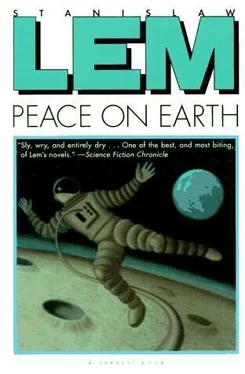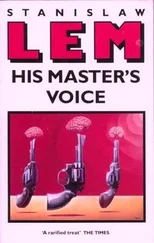“For a man with only half a brain, you’re not stupid. But let’s get back to the subject, that is, to you.”
“You want me to agree to be examined? By the Agency? Let them give my right hemisphere the third degree?”
“It’s more complicated than you think. We have, besides your report and the tapes of the mission, certain hypotheses. One says that the individual sectors on the moon are at war. That they have not united, neither for the destruction of some by others nor to plan an attack on Earth.”
“What exactly has happened, then?”
“If we knew exactly, I wouldn’t have to bother you. The barriers between the sectors definitely failed. The military games have engaged each other. It’s produced unprecedented effects.”
“Such as?”
“I’m no expert on this, but as far as I know, there are no experts on this. We’re at the mercy of conjecture under the banner of, if you’ll pardon my Latin, Ceterum censeo humanitatem preservandam esse. ”
“What is it you want of me?”
“Nothing at the moment. You are, excuse the metaphor, a man with the plague before there were antibiotics. I came to see you because I insisted. They finally agreed. You are sort of a last resort. Who unfortunately multiplied the possibilities of what is happening on the moon. Speaking plainly, after your return we know less, not more.”
“Less?”
“Of course less. We’re not even sure that your right brain contains any critical information. The number of unknowns has increased.”
“You speak like an oracle.”
“The Lunar Agency transported to the moon and placed into sectors what it was supposed to under the Geneva Agreement. But the computer programs of that first generation remained the secret of the participating nations. The Agency wasn’t privy to them.”
“So it was wild cards from the very beginning?”
“Of course, because of the world’s antagonisms. The question is, is it possible to tell the difference between a program that after a few decades derails from the safeties installed by its designers and a program designed to derail in a certain way?”
“I don’t know. Perhaps computer scientists could tell.”
“No, no one can tell except those who wrote the programs.”
“Professor Shapiro,” I said, getting up and going to the window. “I have the impression that you are drawing me into a web. The more we talk, the cloudier the subject becomes. What has happened on the moon? We don’t know. What I experienced there, was it real? We don’t know. What was the reason for this damned callotomy of mine? We don’t know. Does half of my brain hold important information? We don’t know. I most respectfully ask you to get to the point.”
“Most respectfully. You have been treated most respectfully up to now.”
“Because it was in the Agency’s interest, and perhaps in the interest of others as well. Or are you telling me I was saved and protected out of the goodness of your hearts?”
“No. Goodness doesn’t enter into it. As I said before, the stakes are too high. So high, that had we been able to extract what we want from you by torturing you to death, that would have been done long ago.”
An unexpected thought came to me. I turned, my back to the now dark window, and smiled, crossing my arms on my chest.
“Thank you, professor. Only now do I understand who has really been protecting me all this time.”
“But I told you.”
“But I know better. It is they …” And opening the window, I pointed at the moon rising above the trees, a sharp white crescent against the dark blue sky.
The professor said nothing.
“It must have something to do with my landing,” I went on. “With the fact that I went down myself to take what the last remote found, which I could do because there was a spacesuit and lander in the bay. They put them there just in case, and I used them. True, I don’t remember what happened to me when I stood on the moon with my own two feet. I remember and don’t remember. I found the remote but I don’t think it was the molecular one. I remember that I knew why I came down: not to save it, which was impossible and made no sense, but to take something. A sample? Of what? That’s what I can’t recall. The callotomy itself I either didn’t feel or don’t remember, as with amnesia after a concussion, but when I returned to the ship and put my spacesuit back into its special closet, I remember how it was covered with a fine, soft powder. A strange powder, dry between your fingers, like salt, yet difficult to wipe off your hands. It wasn’t radioactive. But I washed as if it had been. Later I didn’t even try to find out what the stuff was, though I didn’t have the opportunity anyway to ask such questions. When I learned that my brain had been severed, I was too taken up with that trouble to think about my hour on the moon. Did you hear anything about that powder? Like talcum. Anyway, I brought something back… but what?”
My visitor squinted at me through his pince-nez, poker-faced.
“You’re warm,” he said. “Even hot… Yes, you brought back something… That’s probably why you returned alive despite your landing.”
He got up and came to where I stood. We both looked at the moon, innocent and bright among the stars.
“The molecular LEMs remained behind,” my visitor said as if to himself. “But, let us hope, destroyed beyond duplication! You destroyed your own although you didn’t know it, when you went to the bay for your spacesuit. That activated the autodestruct program. I can tell you this now because it no longer matters.”
“For a neurological consultant you are remarkably well informed,” I said, my eyes still on the moon as it went behind a cloud. “Perhaps you even know what came back with me. Was that their micropes, that powder so unlike ordinary sand?…”
“No. As far as I know, just silicon-based polymers.”
“And not a virus?”
“No.”
“Then why is it so important?”
“Because it accompanied you back.”
“The spacesuit closet lost its hermetic seal?”
“No. Most likely you inhaled some of the particles while in the rocket, getting out of your suit.”
“And they’re in me?”
“I don’t know if they still are. The fact that it wasn’t normal moon dust we learned when you ran off to Australia.”
“Ah! Every place I’ve been has been put under a microscope?”
“More or less.”
“And… they were found?”
He nodded. We were standing at the window, and the moon sailed through the clouds.
“Does everybody know?”
“Everybody?”
“All the interested parties…”
“Probably not yet. At the Agency, only a few people, and in the clinical department only I.”
“Why did you tell me?”
“You were on the track of it yourself, besides I want you to understand the situation.”
“My situation?”
“Yours and in general.”
“So they’re keeping me under observation?”
“I don’t know to what extent. There are different levels of secrecy here. Based on what I’ve heard from a couple of friends, completely off the record, research is still in progress and they haven’t yet ruled out the possibility that those particles are in contact with the moon…”
“What kind of contact? Radio?”
“Definitely not.”
“Another means of communication?”
“I flew here to ask you a few questions and you’re grilling me.”
“You said you came to fill me in on my situation.”
“But I can’t answer questions to which I don’t know the answers.”
“In a nutshell, then, I have been protected so far by the possibility that the moon is interested in my fate and can step in… ?”
Читать дальше












